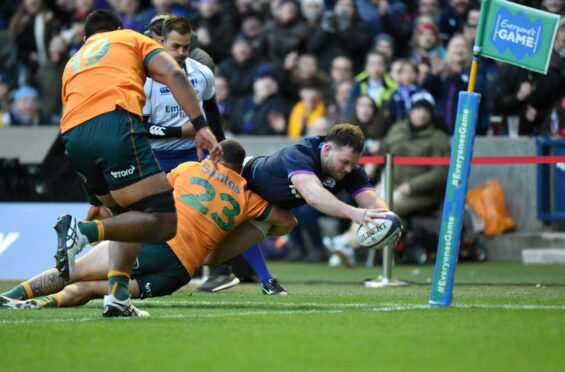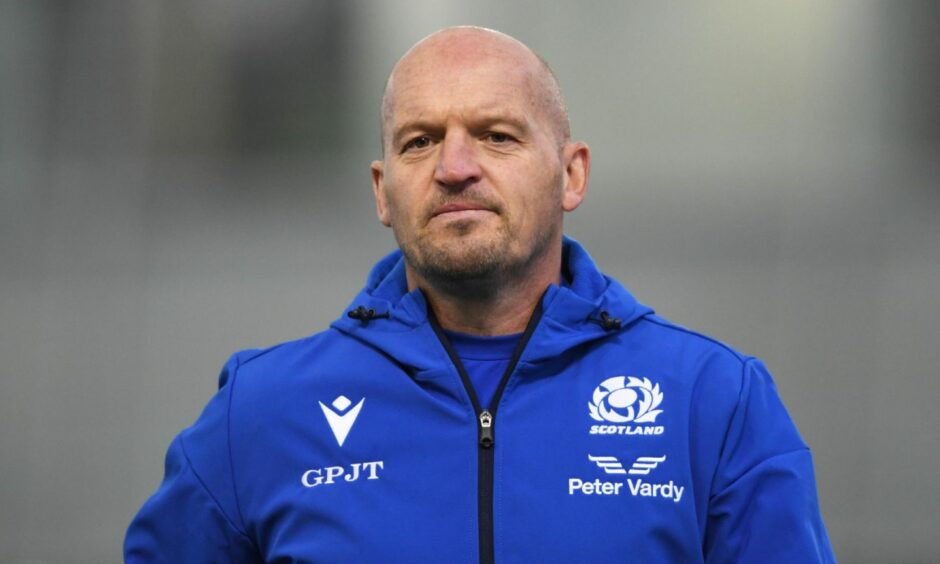Ah, the law of averages. Analytical studies in modern sport – and they’re everywhere now – decry the existence of any such thing.
But the ledger does seem to have a mystical way of balancing. And you feel it’s about to balance to the detriment of Scotland when they play Australia at BT Murrayfield in the opening game of the Autumn Series on Saturday.
First and foremost, Scotland’s recent results against the Wallabies have been rather good.
Since 2009, the Scots have won five of eight games, including all of the last three. One of the Australian wins was THAT Rugby World Cup quarter-final game at Twickenham, the other two have been by a single score.
This perhaps reflects why Scotland are currently ranked sixth in the world while Australia are ninth. Also, the Scots have a 50% record of won six, lost six in the last 12 months, the Wallabies have won three and lost nine.
The last meeting of the sides, almost exactly a year ago, was simply too close to call. Australia felt that a perfectly good try by captain Michael Hooper was chalked off for a marginal high clearout.
Ewan Ashman’s try eventually proved the difference. But it was one of the many wins by Scotland in 2021-22 that didn’t entirely convince.
Hooper took a mental health break the latter half of the Rugby Championship and returns to action for Australia this weekend, and his presence could be crucial.
Rennie’s sorry Murrayfield record
Wallaby head coach Dave Rennie, formerly of Glasgow, has to be under some degree of pressure. The upward curve hoped for the Wallabies hasn’t really materialised, despite the odd decent result.
They beat South Africa, England and Argentina handsomely this summer but subsequently lost to them all in following matches. Consistency, like Scotland, seems to elude them at present.
And if we’re talking laws of averages, you imagine that Rennie has to celebrate a victory at Murrayfield some time. Not once in his tenure at Glasgow did the Warriors win at the national stadium, and that sorry record continued with the Wallaby defeat last November.
But Scotland, I think, are crucially weakened for this game because it’s been scheduled outside the international window.
Townsend has been trending toward a more Scots-based team in recent times, and Duhan van der Merwe’s unexpected return to Edinburgh allows greater scope for that.
But I’d want to see Cameron Redpath, Jonny Gray, Chris Harris and obviously Stuart Hogg.
The definitive judgement for the Blair Switch Project
Townsend has apparently limitless faith in the untried (against top quality opposition) Blair Kinghorn. But I’d definitely want to see Adam Hastings there as insurance against a team as good as the Wallabies, if they’re so bloody-minded to do without Finn Russell.
This experiment – no matter what Townsend says, it’s definitely that – will surely get a definitive judgement in the coming month.
Perhaps there’s actually a method in this. Russell certainly responded to being omitted in last week’s game for Racing against La Rochelle, although I would argue he wasn’t out of form anyway.
And by this time next month, we’ll have a far clearer idea of how Kinghorn operates at the top level with the pressure on him. And whether this project is really worth continuing with.
A cure for white line fever
💙🤍 @scotlandteam#RWC2021 pic.twitter.com/X9o9elbXNt
— Rugby World Cup (@rugbyworldcup) October 23, 2022
Social media posts are no guide to anything, especially when it comes to Scotland teams. Everything coming out of the Scotland camp from the World Cup in New Zealand suggested a happy, united camp.
And you know, let’s just accept it all at face value. Having not been at a World Cup since 2010, the squad quite rightly revelled in being part of the tournament.
We are proud of them that they got there at all. And we are proud of their effort and fight in their three games. The second rows especially, Emma Wassell and Sarah Bonar, were the equal of any duo in New Zealand.
But you can’t escape the fact that Scotland have now lost their last nine games in 2022.
You can put aside the games against England, France and New Zealand. They’re all so far ahead of the rest that it’s barely worth a measurement.
But in all the other six games, the Scots lost by one score. Often conceded late in the game, often after they’d dominated possession and territory.
The unsung hero
🔵 More tackles than any other team (604).
🔵 Three of the top five tacklers in the pool stages. @scotlandteam have left their mark on #RWC2021 🏴 pic.twitter.com/Z24Sn6OMSN— Rugby World Cup (@rugbyworldcup) October 22, 2022
You should hesitate before making any comparison between the men’s and women’s games. But in a broad sense Scotland Women this year remind me very much of Scotland Men in the Andy Robinson era.
Gritty, defensively sound, a strong and well-drilled setpiece, but chronic white line fever. They seem to really struggle to score in a 15-to-15 situation other than lineout drives.
Scotland Men really had this problem all the way up until 2015, when Vern Cotter hired Jason O’Halloran as attack and skills coach.
Suddenly, under the New Zealander’s canny and innovative guidance, they scored tries for fun. He’s the unsung hero of Scotland’s renaissance in the 2010s.
I’m not sure if Bryan Easson is the answer going forward as head coach, or if he wants to continue the role. But Scotland Women really need a Jason O’Halloran to finally reflect their good work on to the scoreboards.


Conversation